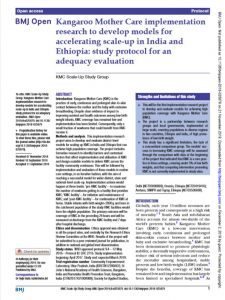
Introduction
Kangaroo Mother Care (KMC) is the practice of early, continuous and prolonged skin- to- skin contact between the mother and the baby with exclusive breastfeeding. Despite clear evidence of impact in improving survival and health outcomes among low birth weight infants, KMC coverage has remained low and implementation has been limited. Consequently, only a small fraction of newborns that could benefit from KMC receive it.
Methods and analysis
This implementation research project aims to develop and evaluate district-level models for scaling up KMC in India and Ethiopia that can achieve high population coverage. The project includes formative research to identify barriers and contextual factors that affect implementation and utilisation of KMC and design scalable models to deliver KMC across the facility-community continuum. This will be followed by implementation and evaluation of these models in routine care settings, in an iterative fashion, with the aim of reaching a successful model for wider district, state and national-level scale-up. Implementation actions would happen at three levels: ‘pre-KMC facility’—to maximise the number of newborns getting to a facility that provides KMC; ‘KMC facility’—for initiation and maintenance of KMC; and ‘post-KMC facility’—for continuation of KMC at home. Stable infants with birth weight<2000 g and born in the catchment population of the study KMC facilities would form the eligible population. The primary outcome will be coverage of KMC in the preceding 24 hours and will be measured at discharge from the KMC facility and 7 days after hospital discharge.